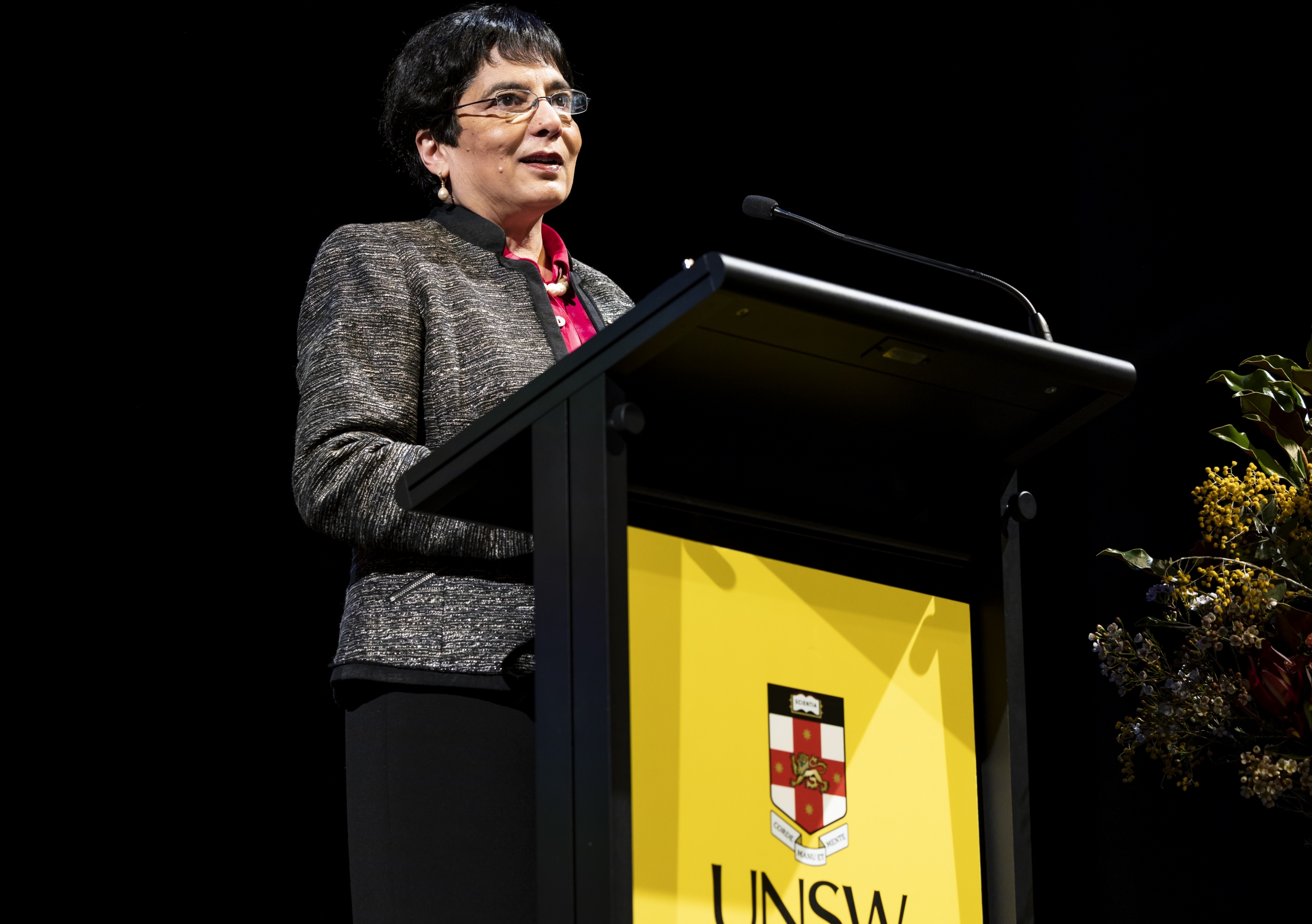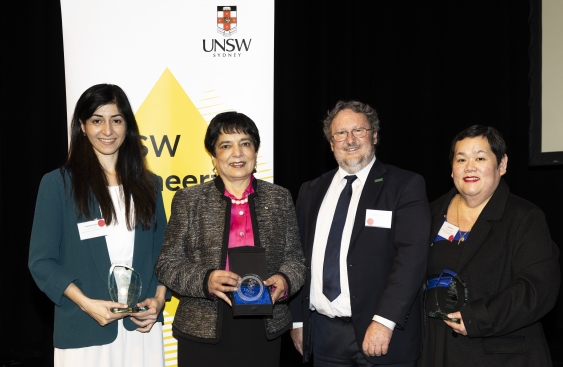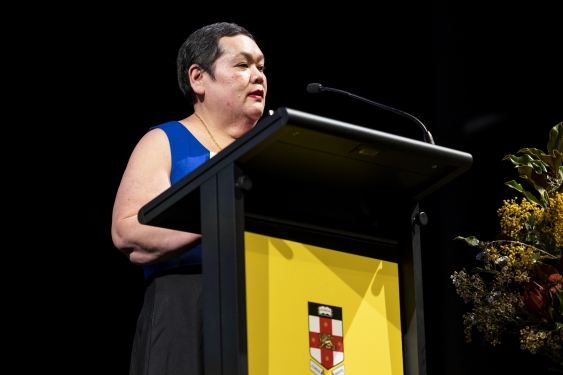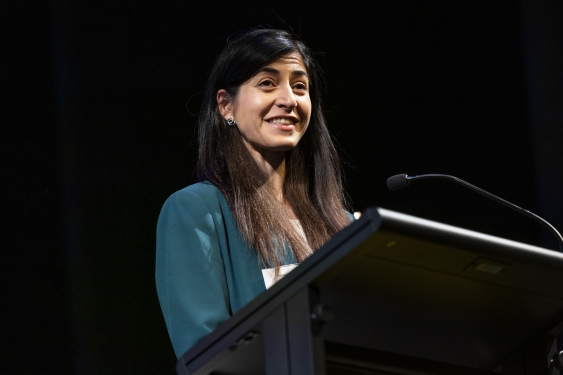2023 Ada Lovelace Medal awarded as women engineers honoured by UNSW
Dr Marlene Kanga AO, Dr Fatemeh Salehi and Dr Olivia Mirza were all recognised at the prestigious UNSW Women in Engineering Awards.
Dr Marlene Kanga AO, Dr Fatemeh Salehi and Dr Olivia Mirza were all recognised at the prestigious UNSW Women in Engineering Awards.

Dr Marlene Kanga AO has urged engineers to keep solving important global problems after being awarded the 2023 UNSW Women in Engineering Ada Lovelace Medal for Outstanding Engineer.
Dr Kanga, appointed an Officer of the Order of Australia for her substantial service to Engineering in the Queen’s Birthday honours in 2022, has previously been chair and national president of Engineers Australia and president of the World Federation of Engineering Organisations.
As president of WFEO she successfully led the proposal for the UNESCO member states to recognise March 4 as World Engineering Day for Sustainable Development, a date now celebrated around the world.
The Ada Lovelace Medal presented to Dr Kanga was the centrepiece of the recent UNSW Women in Engineering Awards ceremony that is designed to recognise the amazing achievement of women engineers who are inspiring, mentoring and proving to be role models for the next generation.

Dr Fatemeh Salehi, Dr Marlene Kanga AO and Dr Olivia Mirza (from left to right) with Dean of the UNSW Faculty of Engineering Professor Stephen Foster at the 2023 Women in Engineering Awards. Photo: UNSW/Ken Leanfore
The Ada Lovelace medal was created by UNSW Engineering in 2016 and is named for Augusta Ada Byron, later Countess Ada Lovelace, an English mathematician who is widely regarded to be the first computer programmer for her work on Charles Babbage’s revolutionary mechanical general-purpose computer, the Analytical Engine.
Previous winners of the award include Mary O’Kane (NSW Chief Scientist & Engineer), Kathryn Fagg (board member of the Reserve Bank and Boral), and Judy Raper (chemical engineer and former senior official in the US National Science Foundation).
One of Dr Kanga's notable achievements is her contribution to sustainable development and environmental conservation. She has been at the forefront of efforts to integrate sustainability principles into engineering practices, emphasising the need for environmentally conscious solutions to global challenges.
Her dedication to sustainable engineering has earned her widespread recognition and admiration within the industry.
On receiving the Ada Lovelace Medal, Dr Kanga said: “This is a great honour and I am truly grateful to receive such an award. There is a special pleasure because this award commemorates such a pioneering woman.
“The remarkable work of Ada Lovelace reminds us that women have been in engineering for a very long time, and have been making vital contributions. It also serves as a reminder to all engineers that our work is far reaching, and can have an impact on people and our planet, both today and a long time into the future.
“Engineers have the skills and the capacity to make the changes we need. And to address the challenges we face.”
Dr Kanga recalled the role engineers made in developing alternatives to chlorofluorocarbons which were targeted for elimination as part of the 1989 Montreal Protocol due to their harmful effect on the ozone layer.
“The 2023 Global Sustainable Development report was released recently by the United Nations and the progress has not been good, it's been very slow. Many of the targets, post-COVID, have gone backwards,” Dr Kanga said.
“Interestingly, the report mentioned engineering only once, in the context of the role of engineers in developing alternatives to chlorofluorocarbons, that were previously being used as refrigerants and considered to be the cause of the hole in the ozone layer.
“After they were banned in some 180 countries in the 1990s, engineers innovated and developed alternatives that have been implemented in refrigeration and cooling systems around the world.
“Consequently, the hole is expected to shrink substantially by 2040, and disappear by 2066. This is an example of how the world came together to solve a global problem which has no boundaries, and where engineers had a vital role.
“And it shows how engineers will also be very important in advancing the wicked problems that we have today. Not just in advancing sustainable development, but reducing carbon emissions, and addressing global warming. Engineers and engineering will be at the forefront of solutions that will be developed.”
The UNSW Women in Engineering Awards event also saw Dr Olivia Mirza receive the Judy Raper Award for Leadership.

Dr Olivia Mirza received the Judy Raper Award for Leadership at the UNSW Women in Engineering Awards. Photo: UNSW/Ken Leanfore
She is Associate Dean Engagement and Professor at Western Sydney University with expertise in forensic engineering to aid the rehabilitation and strengthening of ageing infrastructures.
“One of my passions is looking at diversity in STEM programs, especially engineering. Diversity for me is not only about gender diversity, but also diversity in terms of background and culture,” Dr Mirza said.
“I come from Malaysia and I have experienced discrimination personally because of my race and my religion. Even though I studied very hard and got into the top 3 per cent in our equivalent of HSC, I was not given the opportunity to study at university in the engineering course I wanted to take.
“Fortunately, my parents helped me to be able to study at a private college where I worked hard and was awarded a Golden Jubilee Scholarship to come to Australia in 2000.
“We now have an ASPIRE Indigenous Engineering program at UWS to help Indigenous students academically, but also give them an opportunity to work while studying. And I am very proud of that.”
The Maria Skyllas-Kazacos Young Professional Award for Outstanding Achievement was presented to Dr Fatemeh Salehi, currently Associate Professor in Mechanical Engineering at Macquarie University.

Dr Fatemeh Salehi was presented with the Maria Skyllas-Kazacos Young Professional Award for Outstanding Achievement at the 2023 UNSW Women in Engineering Award. Photo: UNSW/Ken Leanfore
Dr Salehi’s expertise is in the development of physical models for computational fluid dynamic (CFD) simulations of turbulent flows to advance new energy technologies for clean renewable fuels such as hydrogen and biomass.
“I’d like to express my gratitude to UNSW for this award. UNSW was the first place that has been crucial to shape my career to where I am today,” she said.
“I came to Australia from Iran in 2011, to do a PhD at UNSW. It was a big adjustment; everything was new and doing a PhD is very stressful. But I really enjoyed that experience and it set me on the right path to what I am doing today, that I am very passionate about.
“I would like to note that this recognition highlights the importance of diversity and inclusion in engineering. I'm committed to using this platform to empower women and inspire them to follow their dreams and build a career in engineering.
“We need women in engineering, who bring intellectual diversity and different perspectives, to ensure we can create a better future for everyone.”